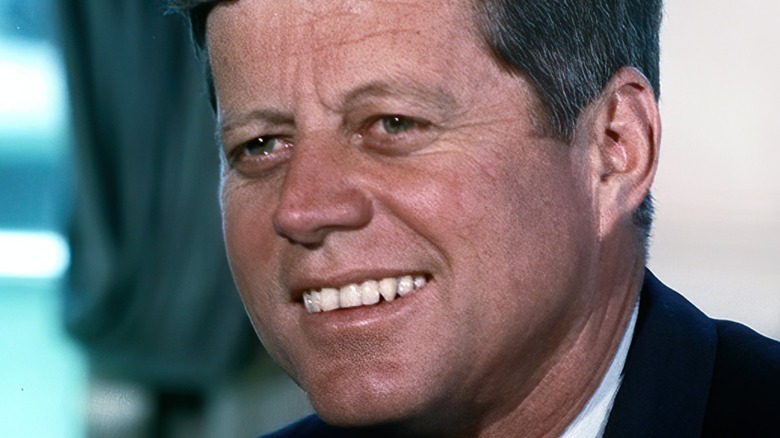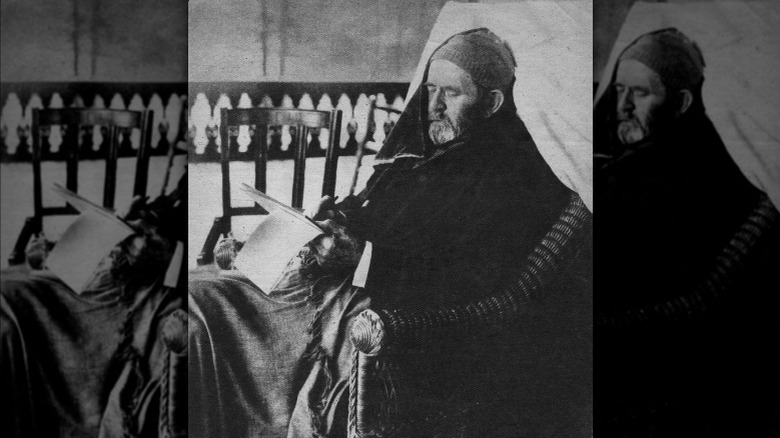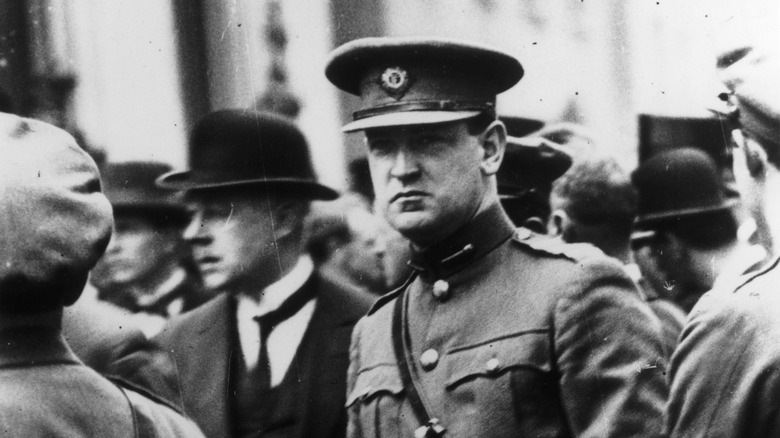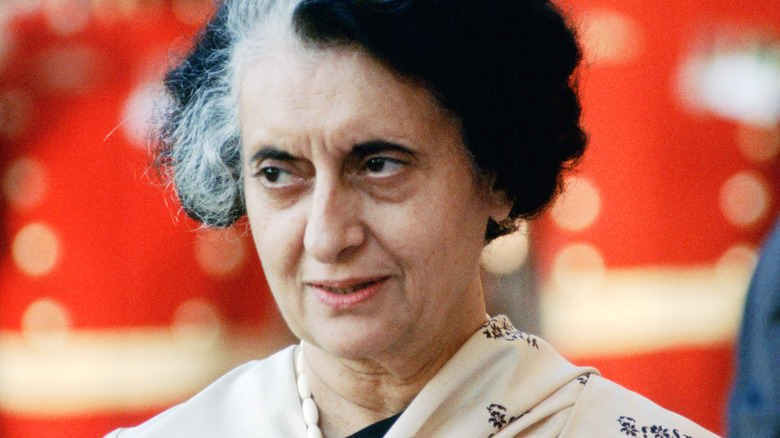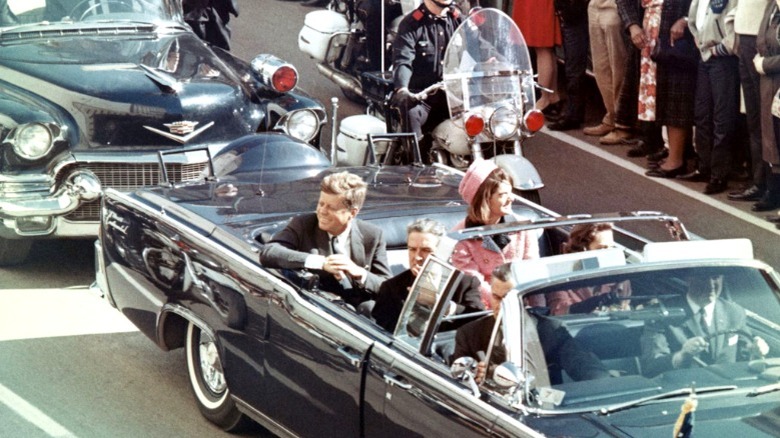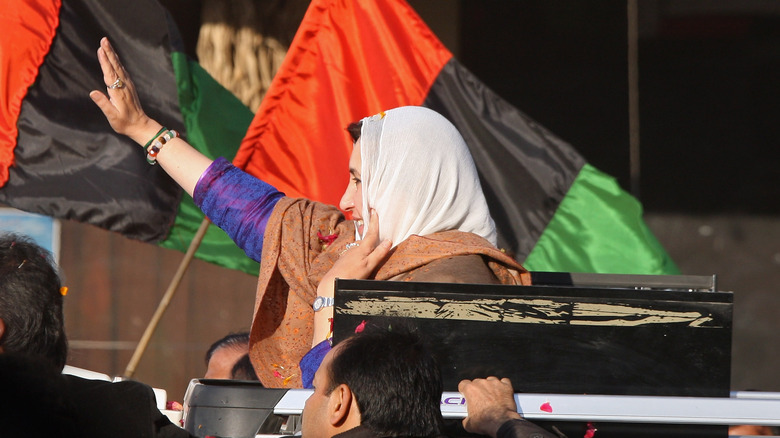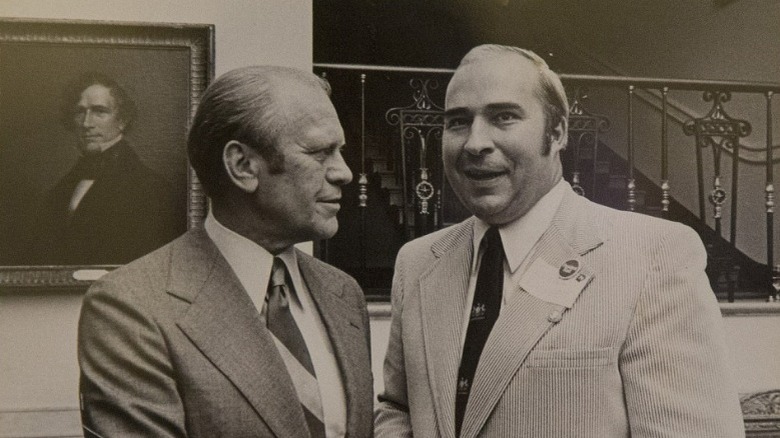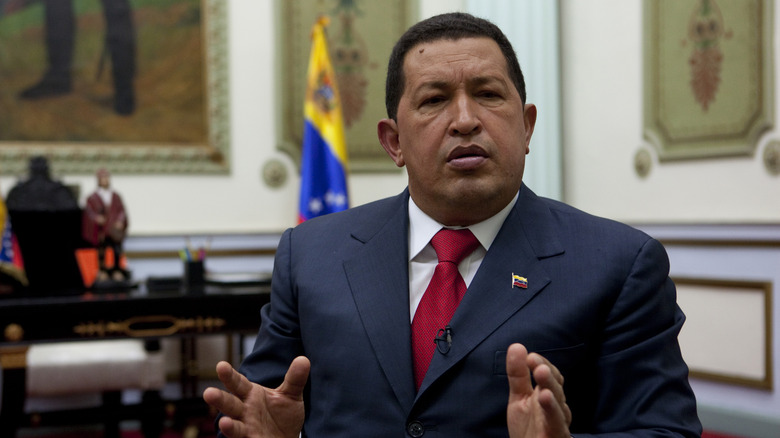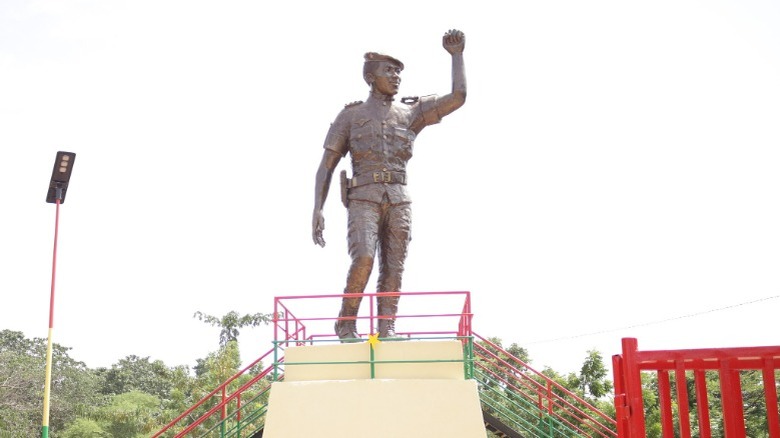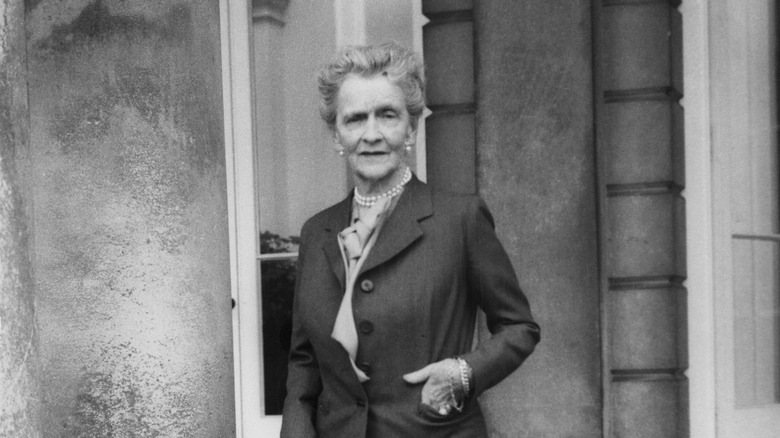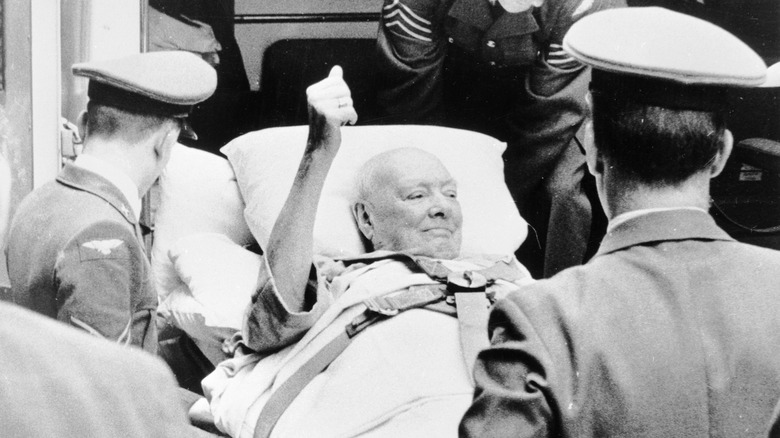The Last Words These Politicians Said Before Death
There's something powerful about the final words a human utters before they die. There are whole books just made up of the last words — or, more often, supposed last words — of famous people who have passed on. Then those of us who are still alive read those brief utterances and imbue them with special meaning. After all, if these thoughts were important enough to the soon-to-be-deceased to impart them at the moment (or near enough) of death, they must have significance far beyond the random statements we all make 100 times every day and then quickly forget about.
Unfortunately, dying is messy and painful and just not fun, plus, a lot of times it comes as quite a shock to those doing the dying. Even politicians, famous for always having the perfect talking point ready, haven't necessarily got deep and meaningful last words ready to go at any second. This means that it is essentially left up to chance if they will say something mundane, sad, poignant, or manage to perfectly sum up their outlook on life and decades of public service in a short sentence. In some cases, usually in the latter cases, it's highly questionable if they actually were the person's last words or just something their supporters made up for them after the fact.
If you haven't put thought into your possible last words yet, let these examples be equally cautionary tales and inspiration. These are the last words these politicians said before death.
Ulysses S. Grant
Ulysses S. Grant, victorious general of the Civil War and president of the United States, was a big fan of cigars. In his retirement after leaving the White House, Grant had 20 cigars lined up on his desk every morning, and by the end of the day, he would smoke them all. He had been getting through about that many daily for two decades at that point. It is, therefore, not at all surprising that he developed throat cancer.
His beloved wife Julia would later remember the first sign of trouble during what she called a "sad summer," (via "Grant's Last Battle"). The Grants had recently learned that due to going into business with a very untrustworthy man, they had almost no money left. Then, one day, according to his wife, Grant ate a peach and "[H]e started up as if in great pain ... He walked up and down the room and out to the piazza, and rinsed his throat again and again. He was in great pain and said water hurt like fire."
Fire was an understatement. The cancer made it an agony, as Grant himself wrote in a letter: "...nothing gives me so much pain as swallowing water. If you can imagine what molten lead would be going down your throat, that is what I feel when swallowing." This made Grant's last word before his 1885 death all the more impactful. As the end came near he said, "Water."
Michael Collins
On the 100th anniversary of Michael Collins' death, Irish taoiseach Mícheál Martin praised him at a memorial event, calling him a hero who had "an irreplaceable role in securing Irish freedom" (via BBC News). Not all of Ireland felt that way in 1922, however. Collins was a leader of the independence movement, but in 1921, he made the controversial decision of signing a treaty with the British that not everyone in his country agreed with.
On August 24, 1922, Collins was traveling in a heavily fortified convoy, per contemporary reporting in The Guardian. Forced to take backroads, the cars drove right into an ambush. An estimated 200 Irish fighters who, after the signing of the Anglo-Irish Treaty, found themselves at odds with Collins, shot at the party, hitting Collins in the head. Before he died, he was reported to have said, "Forgive them. Bury me in Glasnevin with the boys."
However, some have noted that these words are a bit too on-the-nose when it comes to a perfect, memorable last statement in a terrifying moment. The historian and Irish Civil War expert Diarmaid Ferriter told The Guardian these alleged last words are "Classic propaganda. You want to depict your fallen leader as beyond pure, generous even in death. We forget the ordinariness of what happened. He was foolhardy to stop and return fire. There was drink taken. Mistakes made that seem obvious in retrospect."
Indira Gandhi
On October 30, 1984, India's prime minister Indira Gandhi told a crowd of supporters, "I am not interested in a long life. I am not afraid of these things. I don't mind if my life goes in the service of this nation. If I die today, every drop of my blood will invigorate the nation." That statement was only off by a few hours. The next morning, Gandhi was assassinated.
India is a multicultural and multireligious nation, with a minority Sikh population. For two years, some militant Sikhs had been rebelling against Gandhi's government, turning their religion's Golden Temple into an armed compound. In 1984, Gandhi ordered Indian troops to take back the temple by force. Hundreds died, mostly Sikhs. It was notable to those around her that after this bloody event, she still used Sikh bodyguards. Some advisors even asked flat-out if the men could be trusted. Gandhi replied, "When I have Sikhs like this around me, then I don't believe I have anything to fear." She also refused to believe that their religious beliefs meant the men could not do their jobs effectively anymore, and thought replacing them with Hindus would be a bad look, asking, "How can we claim to be secular?"
But the men, one of whom had known Gandhi for a decade, wanted vengeance. On October 31, Gandhi came down in the morning and greeted her two bodyguards, saying, "Namaste." In response, they drew their guns and shot her to death.
John F. Kennedy
There are few events in history that have been more minutely analyzed than the assassination of President John F. Kennedy in Dallas, Texas on November 22, 1963. As his motorcade drove through Dealey Plaza, Lee Harvey Oswald shot and killed Kennedy from the Book Depository building. He was captured shortly thereafter and then murdered by Jack Ruby while being transported. From this, a thousand conspiracy theories blossomed.
But for all the details about the Kennedy assassination that you probably know just from existing in a world that is obsessed with it, do you have any idea what the president's last words were? It is not something that was hidden from the public, no less an unimpeachable witness than Jackie Kennedy testified to the Warren Commission what her husband had said before being shot.
According to the former first lady, right before the shots, the wife of the governor of Texas, who was in the limousine with them, "said to President Kennedy, 'You certainly can't say that the people of Dallas haven't given you a nice welcome.'" Asked what the president replied, she answered, "I think he said — I don't know if I remember it or I have read it, 'No, you certainly can't,' or something." While her memories are the best available source, her response also shows how trauma can warp those memories, so we may never know for sure exactly what was said.
Benazir Bhutto
Benazir Bhutto was the first woman elected to lead a majority-Muslim country when she became Prime Minister of Pakistan in 1988. She served two non-consecutive terms, but things had gotten more complicated after that. In self-imposed exile, she claimed Prime Minister Pervez Musharraf called to intimidate her in 2007: "He threatened me. He told me not to come back. He warned me not to come back." She was back home within months and gearing up to run again.
On December 27, Bhutto traveled to a political rally by car, and as it drew up to the location, she waved to her supporters while standing up through the sunroof (pictured). Her speech went as planned, and as she left the rally, she again waved through the vehicle's sunroof. She was yelling "Jeay Bhutto," which translates to "Long live Bhutto," when an assassin fired at her. Fellow politician Safdar Abbassi was in the car with Bhutto and told The Sunday Telegraph, "She did not say anything more. There was the sound of firing. I heard the sound of a bullet. I saw her: She looked as though she ducked in when she heard the firing. We did not realize that she had been hit by a bullet."
Her assassin, a 15-year-old boy, then blew himself up with a suicide vest, killing more than a dozen other people. Musharraf denied having anything to do with Bhutto's assassination. "Honestly I laugh at it," he told the BBC. "Why would I kill her?"
R. Budd Dwyer
Pennsylvania Treasurer is not the first role one thinks of when it comes to politicians. But in 1987, R. Budd Dwyer made sure his life — and death — in that role would never be forgotten. Having been recently convicted on corruption charges, Dwyer called a press conference. The press came in droves, expecting to see the disgraced politician offer his resignation. But as he gave a long speech that meandered and blamed lots of people — not least of all, the press — and professed his innocence, some of the reporters got visibly bored.
That's when Dwyer pulled a gun out of a manilla envelope. At first, it seemed like he was going to fire into the crowd, but he assured them that was not the plan. As some people rushed forward to stop him, Dwyer exclaimed, "Don't, don't, don't, this will hurt someone." He then died by suicide on live television.
Before the news conference, Dwyer gave his deputy press secretary Greg Penny an envelope containing his organ donor card, but in the end, due to procedural delays, only his corneas and ear cartilage could be donated. "That was another sad thing," Penny told PennLive in 2022. "Here was something he wanted to do as a gesture. It didn't happen the way he wanted to."
If you or anyone you know is having suicidal thoughts, please call the National Suicide Prevention Lifeline by dialing 988 or by calling 1-800-273-TALK (8255).
Hugo Chavez
By the time the end came for Venezuelan dictator Hugo Chavez on March 5, 2013, he had been suffering for a long time. Two years earlier, he had announced on television that he had already undergone surgery for some sort of pelvic cancer, although he did not specify what kind. After that, he needed repeated rounds of chemotherapy and surgeries as the cancer kept returning. By the end of 2012, it was impossible to hide the fact he was extremely unwell and most likely dying. The government even released a photo of Chavez with a breathing tube.
General Jose Ornella was with Chavez when he died. Despite his cancer battle, it was a heart attack that would be the dictator's cause of death. The day before, Chavez went into a coma, but before that, he managed to get his last words across, according to Ornella: "He couldn't speak but he said it with his lips ... 'I don't want to die. Please don't let me die,' because he loved his country, he sacrificed himself for his country."
Despite the fact that no one contested that Chavez had been fighting cancer for years, some in Venezuela tried to start a conspiracy theory about his death. Nicolas Maduro — then vice president, but soon to win the presidential election to replace Chavez — essentially stated that the U.S. must have somehow given Chavez cancer and therefore had assassinated him. Ornella also made statements to this effect.
Thomas Sankara
The Burkinabé revolution that took place on August 4, 1983, brought a young army officer named Thomas Sankara to power in Upper Volta (later Burkina Faso), a country in West Africa. He took power at a difficult time in the continent's history but planned radical improvement projects for his country. Under his programs, millions of people we vaccinated, infant mortality plummeted, and he started unraveling ties with colonial power France.
However, these good works did not make Sankara popular with everyone in the country, according to The Africa Report. Some had been doing well for themselves under French imperialism and would be happy to go back. Others were forced to comply with new directives through "coercive measures." And the military, broadly speaking, was not a fan of Sankara.
Journalist Sennen Andriamirado later reported what happened on the last day Sankara was alive. It seemed like a regular day, full of meetings, making plans with his wife, and taking a nap. His 4:30 p.m. meeting was supposed to be quick, but it had barely started when those present heard a car approaching the building. There were gunshots, and someone demanded those inside come out. Sankara said, "Stay! Stay! It's me they want!" He walked out of the room with his hands raised, but the surviving witness Alouna Traoré said, "He had barely stepped out of the door before he was shot. The attackers had come to kill".
[Featured image by Aimelevrai via Wikimedia Commons | Cropped and scaled | CC BY-SA 4.0]
Nancy Astor
Nancy Astor was born and raised in the United States, but her second husband, Waldorf Astor, whom she married in 1906, was British. Nancy threw herself into the political scene in the U.K., as Waldorf was a Member of Parliament. But there are rules around aristocracy sitting in the House of Commons, and when Waldorf's father died in 1919, he became a viscount and had to give up his elected position to sit in the House of Lords. Nancy seemed to be the perfect candidate to replace him — despite the fact that no woman had ever been elected to Parliament before, and, indeed, only about 2/3 of the women in the U.K. were allowed to vote, and even that had only been the case for a year.
Nancy won the election in a landslide and took her place in Parliament, where she stayed until 1945. She used soft diplomacy to influence foreign policy while concentrating her activities on education and temperance. She also famously had problems with her social acquaintance Winston Churchill.
In April 1964, Lady Astor suffered a stroke, according to her obituary in The New York Times. As recounted by her son, before she died on May 2, Nancy opened her eyes, looked around at all her loved ones gathered at her bedside, and quipped, "Am I dying or is this my birthday?" It is also reported she called out for her late husband Waldorf.
Winston Churchill
Over the course of his astonishing life, Winston Churchill spent six decades in the British Parliament, wrote dozens of books, won the Nobel Prize for Literature, was instrumental in winning the Second World War, and drank so, so much champagne.
This is proof, if proof were needed, that depression is a disease that can affect anyone. Churchill was plagued by what he called his "black dog" during certain periods of his life. While the International Churchill Society feels his mental health issues have been exaggerated in recent decades, they admit he sometimes showed signs of depression.
With this in mind, it makes Churchill's last words especially poignant. While one should be suspect of all last-word claims, Churchill's are pretty impeccably sourced. In a 1965 article, The New York Times reported that the London Evening Standard had it "on excellent authority" that, despite being in a comatose state for the better part of two weeks before he died after suffering a stroke, Churchill had at one point regained consciousness, looked at his son-in-law, and stated, "I am bored with it all." Churchill died nine days after uttering what are believed to be his final words on January 24, 1965, at the age of 90.
If you or someone you know needs help with mental health, please contact the Crisis Text Line by texting HOME to 741741, call the National Alliance on Mental Illness helpline at 1-800-950-NAMI (6264), or visit the National Institute of Mental Health website.
